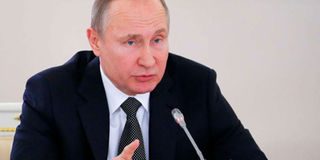Spy poisoning: Russian propaganda detestable

Russian President Vladimir Putin gestures while speaking during a meeting of the State Council at the Kremlin in Moscow on April 5, 2018. PHOTO | ALEXANDER ZEMLIANICHENKO | AFP
What you need to know:
- It is a clear violation of the Chemical Weapons Convention, and as an unlawful use of force, it is a breach of the UN Charter.
- The Organisation for the Prohibition of Chemical Weapons is conducting an independent investigation into the attack.
On April 5, this paper ran a story with the title You poisoned spy, Russia tells UK and US.
That story concerned the attempted assassination of a Russian ex-spy and his daughter in the UK in March.
The implausible suggestion that the UK and US were responsible is just one of 24 different narratives the Russian state has so far offered for this horrifying turn of events.
Other explanations offered by Russia have included: This was a suicide attempt; the attack was conducted by Sweden, or Ukraine, or the Czech Republic, or Slovakia; it was a terrorist attack; it was an attack by Russian exiles; it was an attack by the daughter’s future mother-in law.
What is going on here is an attempt by Russia to obfuscate and distract audiences around the world, but the facts are clear.
NERVE AGENT
What happened in Salisbury, a small city in the UK, on March 4 was attempted murder using an illegal military grade chemical weapon that the UK, and the international community, know Russia possesses.
A weapon so horrific it was banned from use in war.
This was an indiscriminate and reckless act against not just the individuals involved, but also against the United Kingdom, putting the lives of innocent people at risk.
It represents a new and dangerous phase in Russia’s hostile activity outside of its borders.
It is the first aggressive use of a nerve agent in Europe since 1945.
It is a clear violation of the Chemical Weapons Convention, and as an unlawful use of force, it is a breach of the UN Charter.
DEFECTORS
Leading members of the international community agree that there is no plausible explanation other than that the Russian state is guilty.
This conclusion is based on: the positive identification by experts of the specific chemical used as a type of Novichok nerve agent; the knowledge that Russia has produced the agent within the last 10 years and remains capable of doing so; Russia’s record of conducting state-sponsored assassinations; and our assessment that Russia views defectors as suitable targets for assassinations.
The British Government asked Russia to answer one fundamental question at the outset – was this a direct act by the Russian state against the UK, or did the Russian Government lose control of this potentially catastrophically damaging nerve agent and allow it to get into the hands of others?
Instead of answering that question, Russia has responded with a blatant disinformation campaign.
INVESTIGATION
The implausible claim repeated in this paper, that the UK and US were somehow responsible for this attack on British soil, is part of that campaign.
The Russian Government’s approach is consistent with their objective to confuse audiences and distract attention from the fact that Russia has acted in flagrant breach of its international obligations.
The Organisation for the Prohibition of Chemical Weapons (OPCW) is conducting an independent investigation into the attack, as the international organisation mandated to do so.
Russia is also trying to undermine the independence of this process stating it "will accept results of the OPCW Salisbury poisoning investigation only if Russian experts participate in it".
This runs counter to the clear stipulations of the Chemical Weapons Convention. Russia’s position has been rejected by the OPCW Executive Committee.
CRIMEA
The article in this paper also suggested that this was a ‘stand-off’ between two countries, but it is much more than that.
This is the latest example of Russian state aggression targeting a number of countries.
Examples over the past few years include: Russia’s illegal annexation of Crimea in Ukraine; Russia’s cyberattack on the German Parliament; Russian hacking of the Danish Defence and Foreign Ministries; and Russian interference in Montenegro’s elections.
The Russian military also continues to violate the national airspace of several countries, and Russia has used its seat at the UN to consistently protect the murderous Assad regime in Syria.
Russia’s disrespect for international norms and laws is a challenge to democracies, open societies, and free economies around the world.
DIPLOMACY
The UK has responded to this act of aggression by Russia in a proportionate way, in line with international law and norms.
In the largest ever collective diplomatic action against Moscow, 28 countries have now expelled more than 150 Russian diplomats.
This is an unequivocal statement from the international community that they will no longer tolerate Russia’s persistent hostility, and that we will stand together to protect international norms.
Against this backdrop, we must also continue to challenge Russia’s propaganda and misinformation campaign.
We know the truth, and we will not be distracted from it.
Nic Hailey is British High Commissioner to Kenya




